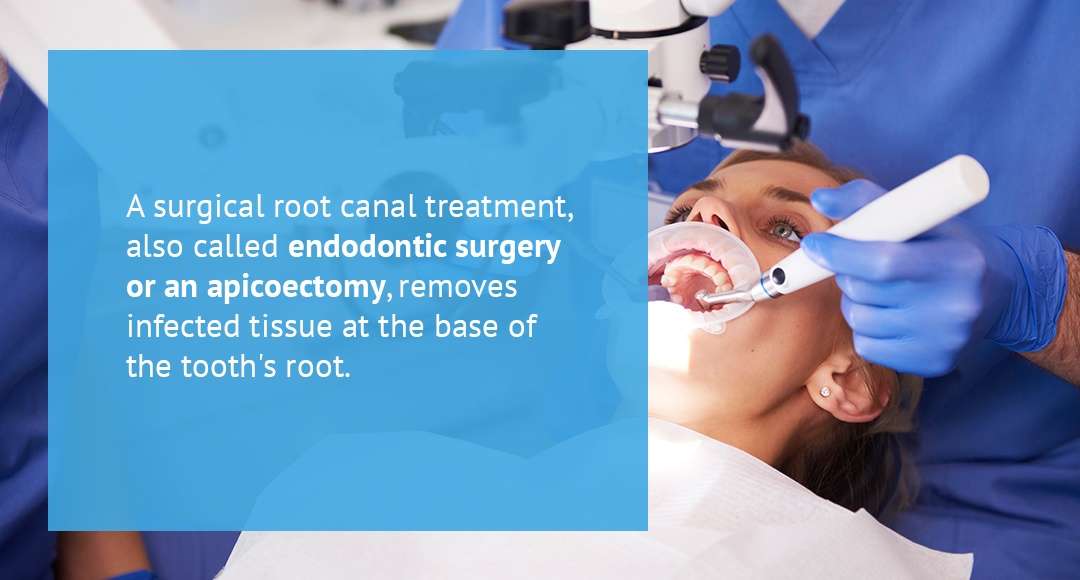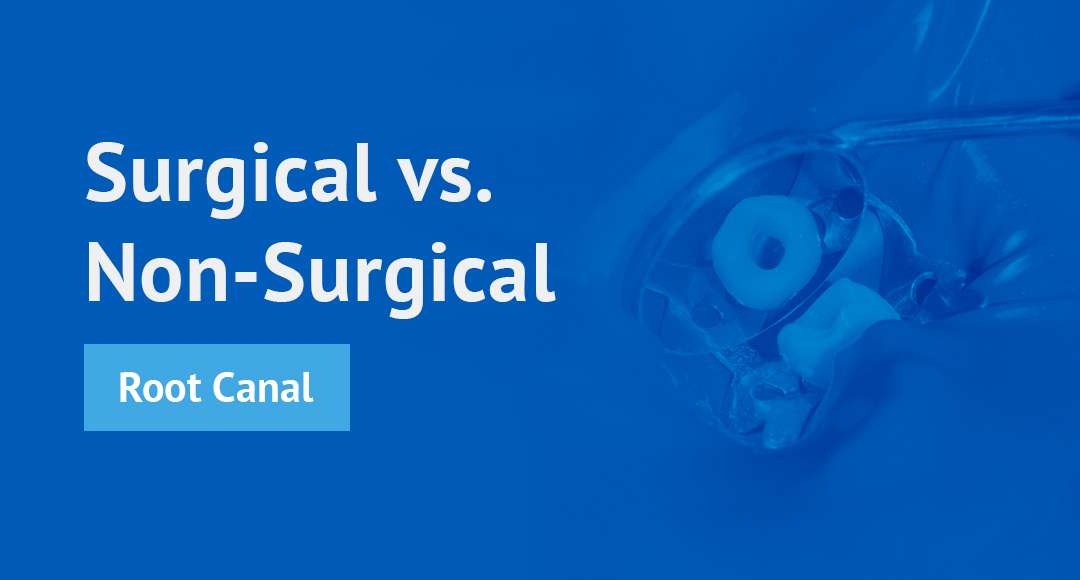Regular oral care and hygiene, including brushing and flossing your teeth each day and seeing a dentist for an exam and cleaning twice a year, can help keep your teeth and gums in the best shape possible. Sometimes, though, your teeth might need treatment beyond preventive care and cleanings.
If a tooth cracks, breaks, or becomes severely decayed, you might need a root canal to remove the affected pulp and any signs of infection inside the tooth. A root canal can save your tooth and is often the best option for patients. Learn more about the difference between a surgical and non-surgical root canal and when your dentist might recommend one instead of the other.
What Is a Non-Surgical Root Canal?

Is a root canal considered surgery? Although a root canal treatment has a reputation for being a complicated, painful procedure, in reality, the treatment is little more than a more in-depth filling procedure. Across the U.S., dentists perform millions of non-surgical root canal procedures each year, making them among the most commonly performed dental treatments.
The goal of a root canal is to save the tooth. While there are tooth replacement options available, such as implants and dentures, many dentists prefer to preserve the natural tooth, if possible. Preserving the natural tooth is also easier for the patient. Your teeth allow you to chew and speak and they affect your smile. When a tooth is missing, the other teeth shift in the mouth, potentially causing a misalignment. Having a root canal treatment is usually more cost-effective for a patient, as you don’t need to schedule appointments to have the tooth replaced or pay for an implant or denture.
At the start of a root canal, your dentist will numb the tooth using a local anesthetic. They will make an opening in the tooth and remove the pulp, bacteria, and damaged nerve tissue from the tooth’s interior. After removing the material, they will clean the interior of the tooth. They might put medicine inside the tooth to ensure that it’s thoroughly cleaned and all bacteria are killed. Once the tooth’s inside is completely clean and dry, the dentist will fill it and seal the tooth. If needed, they will put a crown on top of the tooth to restore it.
Benefits of a Non-Surgical Root Canal
If your dentist recommends a root canal treatment, there are many reasons to consider the procedure:
- It can save your tooth and your smile: Your dentist is likely to recommend a root canal when there is severe decay in the tooth. Removing the decay and any infectious material from the inside of the tooth means you most likely won’t have to have the tooth pulled.
- It’s relatively comfortable: While you might feel some soreness afterward, you aren’t going to feel much of anything during the root canal treatment itself, thanks to the anesthesia. The treatment is also centered on the tooth and doesn’t require the dentist to cut into the gums or other soft tissue.
- It’s cost-effective: A root canal can often be the more economical option, especially when compared to pulling a tooth or not treating the issue.
What Is a Surgical Root Canal?
A surgical root canal treatment, also called endodontic surgery or an apicoectomy, removes infected tissue at the base of the tooth’s root. In some cases, a dentist might perform a surgical root canal if irritation or infection remains in the tooth following a non-surgical root canal. Surgical root canal treatment can help preserve the tooth, and like a non-surgical root canal, it is usually a better option for a patient than pulling the entire tooth.
A dentist performing an apicoectomy or surgical root canal will give you anesthesia before they begin the procedure. They will then make an incision into the gums, allowing them access to the tooth’s root. They’ll remove the tip of the root, as well as any infected tissue. Next, they’ll clean the root canal, as they would during a non-surgical root canal treatment, and will fill it. At the end of the procedure, they will stitch up the gum tissue to close the incision.
Benefits of a Surgical Root Canal
If discomfort persists after a non-surgical root canal treatment, surgery might be your best option to preserve the tooth and get relief. Modern surgical techniques make the treatment itself relatively straightforward and keep the incisions as small as possible. Your dentist will likely use a microscope and digital imaging to guide them as they work, eliminating the need to make a large opening in the gums.
Results from root canal surgery are typically long-lasting, with one study finding that more than 97% of patients had excellent results between one and five years after their surgery.
Who Needs a Non-Surgical Root Canal?
You may need a non-surgical root canal treatment if the pulp inside a tooth is damaged or infected. Several things can damage the pulp in a tooth, including an injury that cracks or breaks the tooth, untreated cavities, and multiple treatments to the same tooth. If you have pain in a tooth or if you noticed that the gums around a particular tooth are swollen, red, or feel warm to the touch, a non-surgical root canal treatment may help relieve your symptoms while preserving the tooth itself.
Who Needs a Surgical Root Canal?
Many people will get the results they want from a non-surgical root canal. In some instances, surgery can be the more appropriate and effective treatment option. Your dentist might recommend a surgical root canal treatment if you previously had a non-surgical treatment that didn’t provide the expected results. Surgery might also be the better option for you if the tooth decay is extensive or if there is damage to the bone near the tooth’s root.
Surgical vs. Non-Surgical Root Canal Cost
The cost of a non-surgical root canal treatment or a surgical option will vary depending on the type of treatment you need and the tooth’s location in your mouth. If you are concerned about affording either a non-surgical or a surgical root canal treatment, you have several options, including paying with dental insurance, signing up for a dental savings plan, and financing the treatment.
Contact Friedman Dental Group to Learn More About Your Root Canal Treatment Options Today
You don’t have to live with a painful tooth. Root canal treatment can save your tooth, improve your comfort, and preserve your smile. Non-surgical root canal treatments are among the general dentistry services offered by Friedman Dental Group. If you have questions about your teeth or want to discuss your treatment options in greater depth, you can reach us using the chat box on our site or send us a message using our contact form.
Last Reviewed By Dr. Eli Friedman on February 16, 2021

